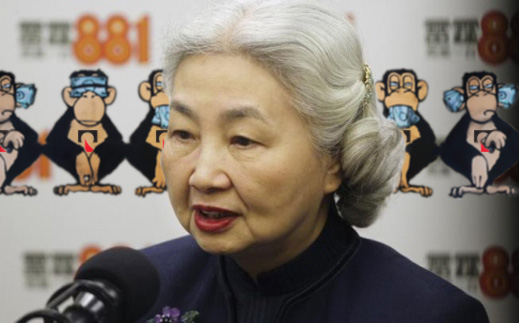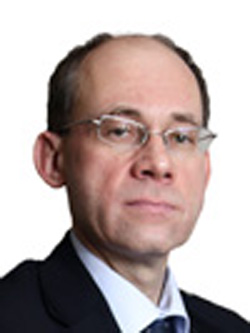
By John Helmer, Moscow
So far Elsie Leung Oi-Se has been paid $632,000 by United Company Rusal to listen attentively, read carefully, and speak her mind at meetings of the main board of directors, and also the audit committee of the board. Rusal titles her an independent non-executive director. She is one of five of those on the 18-member board; one of the 5-member audit committee. According to her company biography, she is a lawyer by training and career. She has also been a politician in the Hong Kong government, the equivalent of minister of justice.
First appointed to the Rusal board on November 30, 2009, when the company’s application to be listed on the Hong Kong Stock Exchange was running into difficulty, she was paid $16,000 for one month’s work. In 2010 she was paid $199,000; in 2011 $209,000; and in 2012, $208,000. She is the lowest paid of her peers, the other “independent non-executive” Rusal directors.
According to the Hong Kong press, Leung can be outspoken when she chooses. She was sharply criticized last year for a speech in which she appeared to criticize Hong Kong’s judges and courts, and to endorse the possibility that the Beijing Government’s obligation not to change Hong Kong’s autonomous institutions and laws may not extend to the judicial bench or the legal code. The Hong Kong media all but called her a stooge of the central government; she was then defended in China Daily for having represented nothing but a personal view, and not an incorrect one. Last month she debated in public the role the central government may play in setting restrictions on who may vote and who may run in Hong Kong’s elections. She has what Rusal calls “a profound knowledge of Asian market practices.”
Election of board members is on the agenda for Rusal’s annual general meeting (AGM) on June 14. According to the agenda paper issued by the company last week, 9 of the 18 directors are up for re-election. Of the independent directors, just two – Nigel Kenny and Philip Lader, first appointed in 2007 – have been proposed for reelection. Leung isn’t one of them.
Because Rusal is listed on the Hong Kong Stock Exchange, the independence of its directors is defined and regulated by the rules of the exchange. These rules require, for example, that directors should “be answerable to the listed issuer for the application or misapplication of its assets”. Directors must “apply such degree of skill, care and diligence as may reasonably be expected of a person of his knowledge and experience and holding his office within the listed issuer.” That’s the Three Monkey rule against seeing nothing, saying nothing, hearing nothing.
Rule 3.13(5 ) of the Hong Kong Listing Rules is the no-stooge rule. It is not allowed that an independent director “should be on the board specifically to protect the interests of an entity whose interests are not the same as those of the shareholders as a whole.” If Leung did what chief executive Oleg Deripaska told her, she would be in violation. If she fails to consult the minority shareholders – Mikhail Prokhorov (17.02%), and Victor Vekselberg and Len Blavatnik (15.8%) – she would fail to qualify as independent.
One of the trickier Hong Kong rules relates to how much money a company like Rusal can pay its independent directors without compromising them and buying their complicity. According to the rule book, “independence is more likely to be questioned if the director… has a material interest in any principal business activity of or is involved in any material business dealings with the listed issuer, its holding company or their respective subsidiaries or with any connected persons of the listed issuer.” How much of Leung’s $630,000, and her expectation of more, amount to such a “material interest”?
The audit committee, to which Leung belongs, is required by company documents to assess Rusal’s internal payment systems, and also to make sure the company doesn’t operate double accounting systems, hiding payments from the external auditor and the public shareholders. If there are grounds for suspicion of the latter, or public charges of fraud and money laundering, it’s up to Leung and her committee to investigate, “ensuring the Company’s compliance with all legal and regulatory requirements.”
One of Leung’s votes as an independent director has already been challenged. The challenge is the action by Vekselberg and Blavatnik before the London Court of International Arbitration (LCIA). This charges that contracts arranged by Deripaska with Glencore for trading alumina and aluminium are disadvantageous to the company, and were taken in violation of shareholder agreements. Leung and other board members voted to approve the Glencore contracts in late 2011, but no record of them or their terms has been mentioned by Rusal’s external auditor, KPMG. The LCIA action commenced in April of 2012.
According to Rusal’s last annual report, “On 4 April and 23 July 2012, the Company received separate requests for arbitration made to the London Court of International Arbitration (“LCIA”), pursuant to the LCIA arbitration rules, for the commencement of arbitration by SUAL Partners against Glencore International AG, En+, the Company and Mr. Oleg Deripaska. The two arbitrations were subsequently joined in one arbitration proceeding. The dispute relates to certain shareholder arrangements between the parties in respect of the Company. SUAL Partners alleges, inter alia, that certain contracts between the Company and Glencore International AG and a contract between the Company and a company indirectly controlled by En+ were, or will be, in breach of those shareholder arrangements. SUAL Partners seek injunctive relief preventing the Group from performing the contracts, annulment of the contracts, an account of profits from, and damages against the defendants.”
As an independent director, Leung will have approved this statement. But it’s not clear she and the audit committee have signed off on this conclusion in the annual report (page 201): “Management do not expect that the arbitration will have a material adverse effect on the Group’s financial position or its operation as a whole.”
What does an independent director do when major shareholders of the company are in conflict? If Leung does nothing, she ceases to be independent and in violation of the Three-Monkey and No-Stooge rules.
 This is the charge against Leung by Vekselberg and Blavatnik reported in the Moscow press this week. Sources close to them confirm that on April 29 they wrote Rusal, formally proposing that at the AGM Rusal shareholders vote on a candidate to replace Leung. Their proposal charges that Leung has failed to act as an independent director. In her place, the candidacy of Dmitry Vasiliev (right) was proposed.
This is the charge against Leung by Vekselberg and Blavatnik reported in the Moscow press this week. Sources close to them confirm that on April 29 they wrote Rusal, formally proposing that at the AGM Rusal shareholders vote on a candidate to replace Leung. Their proposal charges that Leung has failed to act as an independent director. In her place, the candidacy of Dmitry Vasiliev (right) was proposed.
Vasiliev is currently a director of Nomos Bank and a member of its audit committee. His training has been in Russia, UK and the US; in his corporate career he has worked at JP Morgan and Mosenergo. He has held an investment advisor licence from the UK market regulator, the Financial Services Authority.
Rusal responded to the Vasiliev nomination with an announcement to the Hong Kong market, dated May 13, listing separate votes on Leung’s removal and Vasiliev’s election on the AGM agenda. In addition, the board issued its own vote of confidence in Leung to remain on the board. The Rusal announcement says: “The Board wishes to express that it has confidence in Ms. Elsie Leung Oi-sie in her capacity as an independent non-executive Director who, since being first appointed, has performed her duties with diligence, integrity, independence and in the best interests of the Company and all of its Shareholders. Accordingly, the Board has resolved that a further ordinary resolution be included in the notice convening the AGM expressing the confidence of the Shareholders in Ms. Leung (the “Confidence Resolution”). Given that the resolution goes on to express the desire that she continues to serve as an independent non-executive Director of the Company, the Board considers that the Confidence Resolution is conditional upon the Removal Resolution being rejected.”
Leung was contacted by telephone at her office at the Hong Kong law firm, Iu, Lai & Lee. Asked if she would respond to questions about Rusal, she initially said these should be referred to Barry Cheung, a Hong Kong colleague on the board and its former chairman. Cheung is also listed by Rusal as an independent. His position on the board has been challenged by the Kremlin; he was replaced as Rusal board chairman last October. When told the questions referred to her service on the board and on the audit committee, Leung agreed to answer them by email, and she confirmed her address.
These are the questions for Leung:
1. When does your current term as a Rusal director end?
2. Do you wish to continue as a director on the Rusal board?
3. Did you vote to deny the inclusion on the agenda for the AGM of a vote on your candidacy and on that proposed for Dmitry Vasiliev?
4. Your standing and record as an independent have been publicly criticized. How do you respond to the criticism?
5. During your membership of the audit committee of the Rusal board have you examined and approved all of the Rusal accounts? Have any accounts or details you have requested been withheld? Have you disapproved, objected to, or criticized any account items or issues?
6. As an independent director and member of the audit committee have you investigated and approved the amount of the claims on Rusal which the redeemable shareholders of RTI Ltd of Jersey currently hold?
7. As an independent director and member of the audit committee have you investigated and approved payments for aluminium between Rusal and UK limited liability partnerships (LLP), such as Maxberg, whose establishment and supervision by entities such as Inhold (Bahamas) and Milltown Corporate Services (Belize) have been publicly reported in the UK as agents of fraud and money-laundering vehicles?
8. As an independent director and member of the audit committee do you approve the payment by the company of the costs and operating expenses of the aircraft used by the Chief Executive Oleg Deripaska when on non-business and personal trips? Has Mr Deripaska been asked to provide the audit committee with a log of flights on company aircraft, and has he reimbursed the company for his non-business travel?
For more details on the control the RTI redeemable shareholders exercise over Rusal’s accounts and cashflow, read the archive.
Rusal’s use of UK limited liability partnerships (LLP) like Maxberg, and of Caribbean haven operators like Inhold and Milltown was first reported here.
A special report on UK limited liability partnerships has been published this week by Private Eye in London. The authors, Richard Brooks and Andrew Bousfield describe the LLP as “the international criminal’s corruption vehicle of choice.” LLPs and other “shell company scamming” run into several hundred thousand registrations, and in 2011 amounted to an estimated 11% of the entire UK company register. Among the crimes alleged in the report, there are tax evasion, fraud, gun-running and UN sanctions busting, and money laundering. “While it is impossible to measure precisely how many of Britain’s ghost companies are part of international criminal networks, it is in these helpfully crowded and murky waters that some of the world’s most serious organised crooks swim undetected.”
There is no reference in the Private Eye report to Rusal or Deripaska, and no allegation of wrongdoing is reported about or against them. Deripaska’s use of aircraft to fly to holiday destinations was documented here.
Leung confirms receiving the questions. She replied: “No comment.”













Leave a Reply